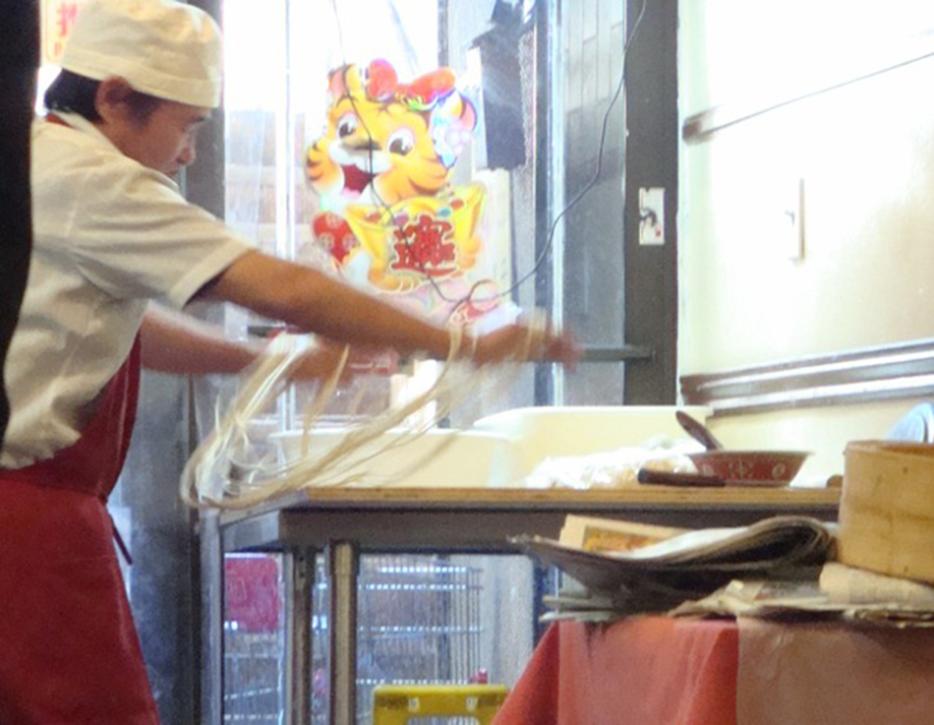Like any worthwhile addiction, the dan dan noodles at Chinese Traditional Bun in Toronto have kept me coming back, before and after the murder.
It always seemed an integral part of adult existence to dine regularly at a Chinese restaurant or deli, often enough that I could refer to them simply as “The Chinese” or “The Deli” and no one would ask, “which one?”
Chinese friends from uptown refuse to eat in my neighbourhood, deriding it as filthy, which it is, the food not up to their standards. It isn’t the best Chinese food; that can be found in more affluent Markham. But driving 40 minutes for dinner is never spontaneous. And part of the appeal of Chinese restaurants, the reason that Jews dine in them on Christmas, is that they are ubiquitous and always open. The Chinese food restaurant represents an idealized gathering place for late-night, salt-and-fat-soaked roundtable discussions among drunken friends.
It took a long time to find my Chinese restaurant and the friends to go with it.
In my Chinatown there are 71 restaurants. That’s not counting Tim Hortons, McDonald’s, Popeye’s Chicken, various bakeries and cafes, Vietnamese sandwich shops, and the many food businesses inside two malls. All year round, breezes blow trash along the sidewalks, trapping candy wrappers and cigarette butts in the stairwell that leads down to the entrance of Chinese Traditional Bun at 536 Dundas Street West. It is easy to miss. But a friend told me to go there and order the dan dan noodles, the same friend who’d helped me pick out a mattress, sunscreen, moisturizer, and plan an exercise regime. I trusted her.
The first time I wandered in through the transparent flaps and ordered the dish, the server asked me if I wanted handmade noodles for an extra dollar. That brought the price up to $7.99, about half of what any Italian restaurant would charge for homemade pasta. (Then again, you’re unlikely to find a good Italian restaurant around here where the tables are set with disposable white plastic sheets and jars of chili oil that only get wiped down once every Year of the Rabbit.)
Most afternoons you can see the cooks making these noodles—long ropes of irregular thickness—as you enter. The owner, Gaoliang Ma, says they’re a staple of Shaanxi Province, which he left 12 years ago, having lost his job repairing Russian airplanes after 9/11. For the dan dan, the long noodles are placed in a bowl with two sauces: a chili oil made with a billion roasted sticks and barks (rhizome of galanga resurrection lily, cassia peel, root of dahurian angelica, etc.) and a sticky ragu of pork, the ground meat slicked with fermented bean paste and chunks of bamboo shoots. You are meant to toss the ingredients yourself, the way a brunch restaurant reserves for the diner the pleasure of breaking the egg’s yolk.
The noodles are about two feet long. Gulping them down, chasing and slurping the doughy strands, leaves your face smeared with chili oil, lips tingling from Sichuan peppercorns. When sharing with friends, I’ve learned to bring scissors.
*
Between a publication ban, and Mr. Ma’s refusal to comment—he will refer only to “the incident”—we still don’t know what happened the day of the murder. It is alleged that on the afternoon of December 28th, 2011, Chi Sung Kuan, one of the cooks, stabbed one of the managers, Guang Lu, who died in the hospital of her injuries. A year and a half later, I went to court to watch the trial; Mr. Kuan, who is charged with second-degree murder, is still without a lawyer.
Newspaper stories about the crime had never shown the victim’s face, only a cellphone photo of the restaurant’s front door, the plastic drapes smeared with blood. But I had become a regular, and I suspected who the victim was: a curly-haired woman in her 40s, who’d become friendly enough to greet me warmly and say it had been too long since I’d last come.
After the incident I’d pass by once a week, to see if they’d reopened. It seemed unlikely.
I scoured Chinatown for a replacement. I dragged friends to the nearby North-East Chinese Restaurant, which serves similar cuisine and is also in a basement. We had laughs that night, because we were friends eating in a Chinese restaurant and life needs more of that. But the food did not have that magic.
Later that winter, CTB reopened.
The first thing that hit me was the absence of the curly-haired manager, and I was seized with the certainty that she was dead. I didn’t know what to say, how to express my condolences. None of the new staff recognized me, or spoke much English. So I ate my noodles quickly and left without saying goodbye, vowing to return with friends.
The place was cleaner, the hallway leading to the bathroom no longer stacked with cases of soda and napkins. There were new menus. Before the stabbing, the radio was always tuned to classical music; now, a small television mounted on the wall announced weather and headlines on a local 24-hour news station.
A new server spoke zero English when she began. At first we communicated through pointing and mime. Over the summer I watched her build a vocabulary, starting with “hello” and “goodbye,” working up to “water,” “tea,” “noodle,” and “spicy,” with all the attendant confidence that comes with learning a new language.
And then, a year after the incident, as I stepped through the door to meet some friends for dinner, there was the manager at the cash register, alive, with her curly hair and her disarming smile.
“Hello,” she said. “I don’t see you for such a long time!” I wanted to hug her, to tell her that I’d thought she was dead and was excited to find her alive. But I didn’t even know her name. And besides, someone else was dead.
I arranged to speak with Mr. Ma, my friend Jennifer Yang—who’d taken that cellphone photograph in the wake of the crime—interpreting in Mandarin. He explained that the curly-haired woman is his wife, Linda Liu, mother of his two children. She works mostly at his other restaurant, Shaanxi Legend, which is busier. That’s why I hadn’t seen her.
“We survived SARS. We survived the construction,” said Mr. Ma. “And we survived the incident that we are aware of.” (Yes, road construction in Toronto is sufficiently horrible for small business owners that he equates it with a pandemic and a murder.) “There have been a lot of challenges. We have a dedicated clientele. During the difficult times they’ve stuck by us.”
Many of us remain loyal to a restaurant, even one of questionable quality, because we like the people, it’s close to our home, or simply because it fills some hole in our lives. But the reason I keep coming back is that Mr. Ma’s dan dan noodles are one of the best dishes I’ve ever eaten.
In fact, they have improved since the murder.






